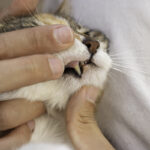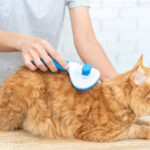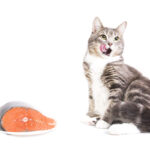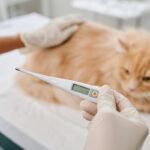The significance of essential oils has increased to such an extent for a reason that it truly benefits humans in various ways. Essential oils these days have been used for several things ranging from medical treatment to cleaning and a plethora of personal care products.
Are Essential Oils good for cats? Well, the oils that we think as a boon to humans are quite harmful for felines. Although few things may be natural it doesn’t mean that it is safe in all ways. Essential Oils are usually prepared upon extraction of flavor and aromatic compounds from different plants.
You might be wondering how safe are essential oils for cats. Though there are copious safe essential oils that can be used on felines, still certain essential oils must be avoided considering their toxicity. Before trying to use any type of essential oil on your cat, just go through this detailed guide to find out the Toxic Essential Oils For Cats and the signs of essential oil toxicity. Read on!
Contents
- Essential Oils And What Are They?
- Are Essential Oils Safe For Cats?
- Essential Oils That Are Toxic For Cats
- Signs For Essential Oil Toxicity
- What to do If I Notice My Cat Is Exposed to Essential Oils?
- How Is Essential Oil Poisoning Treated In Cats?
- How To Prevent My Cat From Essential Oil Exposure?
- Conclusion
Essential Oils And What Are They?
Essential Oils are the oils that are extracted from certain plants, purified, and then concentrated further for further utilization. Through distillation or cold pressing mechanisms, essential oils are distracted from plants. However, not all essential oils are extracted from plants.
In general, essential oils are used in a plethora of ways that include personal care products, insecticides, aromatherapies, liquid potpourri, herbal-based home remedies, flavors, etc. Essential Oils have been used as herbal medicines for several decades though the FDA hasn’t approved these essential oils for therapeutic usage in pets and humans.
Aromatherapy is another form of using essential oils to enhance the health. In this form of therapy, essential oils are applied to the skin. Essential Oils are made of highly concentrated plant extracts.
During the extraction process, essential oils are prepared by pressing or heating different parts of the plant such as the seeds, fruit, leaves, bark, and flowers. Upon heating for a long time, a concentrated liquid is formed having a decent smell. This is the way essential oils are extracted from plants. A plethora of essential oils are made out of specific plants that aid in reducing stress, boosting mood, and providing several other health benefits.
There are more than 120 essential oils extracted from a wide variety of plants. Some of them include:
- Ajwain Oil
- Asafoetida Oil
- Agar Oil
- Basil Oil
- Bergamot Oil
- Angelica Root Oil
- Black Pepper Oil
- Buchu Oil
- Bay Leaf Oil
- Camphor Oil
- Caraway Seed Oil
- Calamus Oil
- Calamodin Oil
- Carrot Seed Oil
- Cinnamon Oil
- Chamomile Oil
- Ceda OIl
- Clove Oil
- Coconut Oil
- Coriander Oil
- Elecampane Oil
- Dill POil
- Curry leaf Oil
- Cumin Seed Oil
- Fenugreek Oil
- Ginger Oil
- Garlic Oil
- Goldenrod Oil
- Grapefruit Oil
- Henna Oil
- Jasmine Oil
- Lavender Oil
- Lemon Oil
- Linalool Oil
- Melissa Oil
- Marjoram Oil
- Mugwort Oil
- Mustard Oil
- Orange Oil
- Nutmeg Oil
- Neem Oil
- Red Cedar Oil
- Peppermint Oil
- Pennyroyal Oil
- Sage Oil
- Rosewood Oil
- Spruce Oil
- Tarragon Oil
- Ylang-Ylang
- Yarrow Oil
- Wintergreen Oil
- Turmeric Oil
- Thyme Oil
- Tea Tree Oil
- Vetiver Oil
Among this wide range of essential oils, many of them are toxic for cats. Though these essential oils are extracted from natural sources, not all of them are safe for pets. Some of them may cause harm to the feline’s health. Usually, essential oils are used for aromatic purposes or medical uses.
When these oils are used in aromatherapy, they are applied topically to massage the body. Otherwise, the essential oils are used to practice the process of inhaling. When cats inhale this essential oil, the scent molecules present in the essential oils move from the olfactory nerves to the brain. Once these molecules travel to the brain they show a major impact on the key center of the brain i.e., the amygdala.
Are Essential Oils Safe For Cats?
Planning to use essential oils on your cat? Before using any of the essential oils on your cat, you need to find an answer to this question. Do you think ‘Are Essential Oils Safe For Cats?’ Precisely, no essential oil is safe to use on cats. When essential oils are absorbed by the cats through the skin or mouth, they settle down in the liver.
Felines’ liver enzymes can’t break down the oils entered into the liver. As a result, these oils can’t be eliminated easily from the body. This in turn results in the accumulation of toxic oils in the cat’s blood flow leading to toxicity in cats.
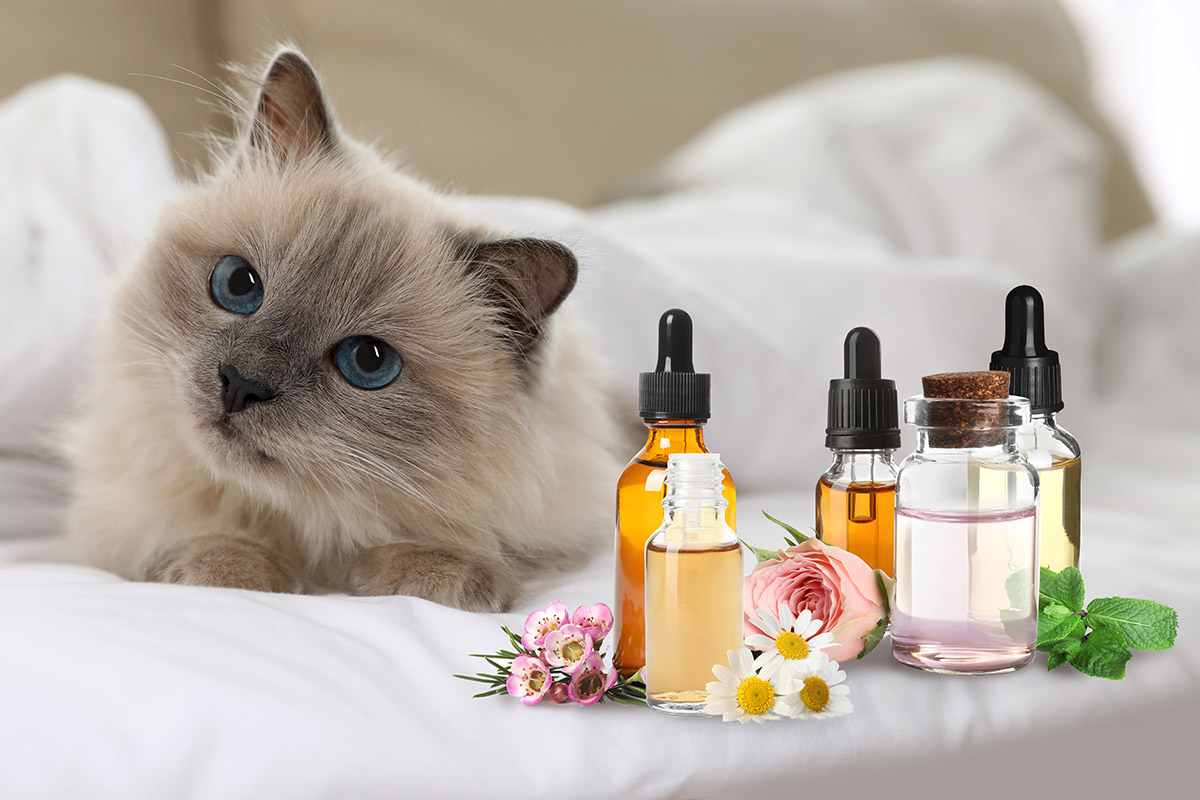
The major thing to understand is that the more undiluted the oil is the more toxic it becomes to your cat. For instance, during aromatherapy, essential oils are spread throughout the room using a diffuser. When these oils come in contact with the cat’s skin or are inhaled irritate the respiratory tract lining of the cat.
Sometimes, it could reach the lungs and liver increasing the toxicity. As a result, your cat may have breathing difficulty and sometimes, it could be a life-threatening problem. But, certain essential oils are considered to be safe when they are diluted.
If essential oils are used on cats as is, it affects the skin and digestive system of the cat. The reason is that the essential oils are very strong compared to the diluted ones. When you ingest essential oil from your cat, it may lead to skin irritation and sometimes cause digestive problems as well.
Essential Oils That Are Toxic For Cats
As explained before, essential oils are extracted from various plants. Despite coming from natural plants, they are extracted in high-concentration forms. Wondering What Essential Oils Are Toxic To Cats? Well, a plethora of essential oils are toxic to cats.
Any essential oil can cause toxicity in cats when ingested in concentrated forms. However, certain essential oils can lead to serious illness and are considered poisonous to cats. Essential oils can lead to toxicity in household pets and the major risk will be to cats.
The major problem that cats face when ingested orally or topically is liver disorders. Liver enzymes can’t break down the oils and can’t eliminate the toxins present in these oils. However, there are specific essential oils that are bad for cats. Here’s a list of essential oils that show adverse effects on cats. Check it out!
1. Peppermint Oil
Peppermint oil is extracted from peppermint leaves. This oil comprises a high concentration of pulegone [a natural pesticide] and menthone. Peppermint oil is toxic when ingested by cats in any of the forms. It may cause skin irritation if this oil is applied to the skin of the cat. If this oil is consumed or smelled by the cat, it causes gastrointestinal problems.
2. Wintergreen Oil
Wintergreen oil is extracted from the wintergreen plant’s leaves. Though this oil helps relieve pain and aches in humans, it is dangerous for cats. When the cat is exposed to this wintergreen oil, it leads to various health issues such as diarrhea, vomiting, breathing difficulty, heavy breathing, and sometimes organ failure.
3. Clove Oil
Clove oil is extracted from the clove plant. In general, clove oil is utilized in aromatherapy and some medicines. The major disadvantages of using clove oil in cats are gastrointestinal problems, breathing difficulty, liver damage, and more.
4. Eucalyptus Oil
Eucalyptus oil is extracted from the leaf of Eucalyptus. Eucalyptus oil is used in a wide variety of applications such as fragrance, flavors, pharmaceuticals, repellents, and other industrial uses. In the case of felines, Eucalyptus oil may cause serious illnesses like vomiting, diarrhea, difficulty breathing, drooling, etc.
5. Cinnamon Oil
Cinnamon oil is extracted from the cinnamon bark which gives a strong aromatic taste. In general, cinnamon oil is used in foods to give cinnamon flavor to the dishes. But, if you use cinnamon oil for cats, it may cause adverse effects on them. Cinnamon Oil is another harmful essential oil to cats that causes skin irritation and mucous membranes.
6. Pine Oil
Pine Oil is one of the Toxic Essential Oils For Cats extracted from a variety of pine species, especially Pinus Sylvestris. Some of the specific parts of the Pine tree are ground and given steam distillation.
Ultimately, the extracted pine oil is used in aromatherapy, lubricants, and more. When Pine oil is ingested by cats, it irritates the mucous membranes leading to skin redness, and mouth and oropharynx redness.
7. Tea Tree Oil / Melaleuca Oil
Tea Tree Oil is also referred to as Melaleuca Oil. It is one of the essential oils that has a fresh odor with a clear and pale yellow color. Tea Tree Oil is extracted from the leaves of tea-tree usually found on the northeast coast of New South Wales, Australia.
Usually, Tea Tree Oil is used in treating a variety of diseases such as bacterial infections, fungal infections, dandruff, acne, herpes, and more. Tea Tree oil is extremely toxic to felines. Still, we can see this oil present in a variety of pet products. Tea Tree oil causes lethargy, liver disorders, muscle tremors, and other health-related issues in cats.
8. Ylang Ylang Oil
Ylang Ylang is also known as Cananga Odorata. Ylang Ylang Oil is extracted from the tropical tree i.e., the Cananga tree originated in Philippines. Ylang Ylang essential oil produces highly fragrant essential oil used for various purposes. Ylang Ylang oil is highly poisonous to cats. When this oil is ingested or exposed to the skin of cats, it causes severe toxicity.
9. Pennyroyal Oil
Pennyroyal Oil is otherwise known as Mentha Pulegium or Pennyrile. It is also referred to as mosquito plant and pudding grass. Pennyroyal Oil is extracted from this mosquito plant. If pennyroyal oil is given to humans or pets even in small quantities, it could be extremely toxic.
In general, pennyroyal oil is only helpful in eradicating house dust mites. Pennyroyal Oil is highly utilized as an insect repellent. When cats are exposed to Pennyroyal Oil, it causes seizures in cats. Some other health issues include severe liver damage, respiratory problems, etc. In some worst scenarios, Pennyroyal Oil may even cause death to felines.
10. Citrus Oil [Oil that comprises d-limonene]
Usually, citrus oils are extracted from citrus fruits such as lime, orange, lemon, etc. Limonene is the major component in the preparation of citrus essential oil. Citrus Oils are extremely toxic to cats as they could cause skin irritation, gastrointestinal problems, and sometimes nervous system depression.
11. Oil Of Sweet Birch
Oil of Sweet Birch is extracted from the bark of birch trees by undergoing it through steam distillation. Sweet Birch Essential Oil has a strong aroma with a thin consistency.
In general, Birch Oil is used in massage oils, body salves, lotions, and as a topical inflammation. Oil of Sweet Birch is another essential oil that is poisonous to cats. Some of the adverse effects of sweet birch oil on felines include skin irritation and gastric problems.
Other essential oils that are toxic to cats include:
- Dill Oil
- Fennel Oil
- Thyme Oil
- Basil Oil
- Spearmint Oil
- Rosemary Oil
- Oregano Oil
Now, you might have got an answer to the question ‘What Essential Oils Are Bad For Cats?’ Apart from these 10 essential oils, many other essential oils are toxic to cats. Make sure you take necessary precautions by not exposing your cat to these essential oil aromas.
Signs For Essential Oil Toxicity
If you use essential oils near your cat or directly ingested to your cat then, you may witness some negative reactions from your cat. Sometimes, your cat may feel sick due to its exposure to the essential oil.
As a pet parent, you can understand the illness in your cat through specific Symptoms Of Essential Oil Poisoning In Cats. In this article, we have compiled a big list of signs you can watch out for in your cat when exposed to any essential oil. Check it out!
- Drooling
- Difficulty Breathing
- Vomiting
- Diarrhea
- Muscle Tremors
- Coughing
- Decreased Heart Rate
- Unusual Walking
- Wheezing
- Panting
- Consistently rubbing their face
- Redness within the mouth especially the gums and lips
- Lethargy
- Fatigue
What to do If I Notice My Cat Is Exposed to Essential Oils?
Once you understand that your cat is exposed to essential oils through the Symptoms of Essential Oil Poisoning in Cats, you need to take necessary precautions. Once you understand that the cat is exposed to essential oils, make sure you move your cat to the location where it gets fresh air.
When you notice that your cat reacts negatively to any of these essential oils like difficulty breathing and unusual behavior, the first and foremost thing to do is to contact the veterinarian immediately. Don’t use any medications or home remedies on your cat without the approval of the veterinarian.
Don’t give bath to your feline when the essential oil is exposed to the cat’s skin. When you use specific soaps or cleansers on your cat while giving bath, the chemicals present in the soaps may negatively react with the essential oil and makes it even more problematic.
Don’t forget to carry the essential oil you’ve used on your pet to show it to the veterinarian. By doing so, your veterinarian will be able to diagnose the problem easily and tries to treat the issue with precise medication or treatment.
Speak to the veterinarian regarding the type of essential oil to which your cat is exposed. Be sure to tell whether your cat has licked the essential oil, applied it on the skin, or inhaled it directly through the nose or mouth. If you are specific about the mode of ingestion or exposure of the essential oil to your cat, the vet will be able to give proper treatment.
The veterinarian will observe the symptoms of essential oil toxicity in the cat through physical examination and tell whether it’s an emergency or not. Depending on the type of essential oil used in cats and the current medical history of cats, you can witness certain symptoms in your cat.
The most common symptoms that can be seen in cats due to essential oil exposure include vomiting, lethargy, drooling, respiratory problems, tremors, unsteady walking, etc. Due to these symptoms, your cat’s heart rate fails to remain consistent. You may witness fluctuations in the cat’s body temperature.
Liver failure and breathing difficulty are the fatal conditions you may witness in your cats in the worst conditions. If you have observed your cat’s adverse reaction hours after being exposed to the essential oil and if the vet is not reachable, make sure you call the nearest pet emergency clinic. If you are unable to reach the veterinarian, you can even contact the Pet Poison Helpline i.e., at (800) 213-6680.
How Is Essential Oil Poisoning Treated In Cats?
The veterinarian will notice the problem caused in the cats due to exposure to essential oils or essential oil poisoning. Once the vet confirms the health issue, he/she will administer activated charcoal and IV [Intravenous fluids].
Later, the vet will take necessary decontamination measures to treat essential oil toxicity. If the essential oil is given in overdosage then, the vet will prescribe medications to protect the liver. Sometimes, the vet may give antibiotics to treat this poisoning in cats.
How To Prevent My Cat From Essential Oil Exposure?
If you are using essential oil products in any of the forms in your home, you must take certain preventive measures from exposing your cat to the essential oil. Sometimes, people use essential oils in a variety of forms such as home fragrances, laundry, cleaning sprays, hand sanitizers, skin moisturizers, flea repellents, etc.
- You can’t avoid using any of these products at home despite being a pet parent. In such a situation, the only thing you can do is take the required precautions to prevent your cat exposed to these essential oils. Check it out!
- Before using essential oils near your cat, try to dilute the essential oil so that its concentration gets reduced and shows no effect on the cat.
- Be cautious while using essential oils and diffusers at home to secure your cat from the risk of toxicity.
- Don’t apply concentrated essential oils on the cat’s skin for whatever reason.
- Don’t diffuse the essential oils into the air in concentrated forms. Try to dilute the oil and only then diffuse them into the air.
- Keep the essential oils out of reach of your feline companion. Make sure you store them in tight containers to evade your cat from reaching it easily.
- Try to use pet-friendly cleaners instead of the products made of toxic essential oils.
- Observe your cat if it shows any signs of distress, discomfort and other adverse reactions after using an essential oil near your cat. Later, you can contact the vet if necessary.
- Whenever you try to use an essential oil in your home or on your body, make sure you keep all your pets or your cat in quarantine so that the cat doesn’t get exposed to the oil.
- Don’t hold your cat in your cats after using these oils on your body. Make sure you avoid contact with your feline directly until the oil is absorbed into your body fully and doesn’t shed any sort of odor of the essential oil.
- Ask your vet before using any kind of essential oil on your cat.
- If you notice any unusual behaviour and other warning signs of poisoning in your cats, immediately speak to the veterinarian.
Conclusion
Well, this is everything you need to learn about the Toxic Essential Oils For Cats. We hope this article has given adequate information about the types of essential oils that are toxic to cats, symptoms of essential oil poisoning in cats, precautions and preventive measures.
Make sure you speak to your vet before using any kind of essential oil and diffuser on your cat at home. If you still have any queries about this article, feel free to ask us in the comments section. Stay tuned to our website ‘TheCrazyCats.Net’ for more articles related to cat diseases, food habits, behaviors, etc.


